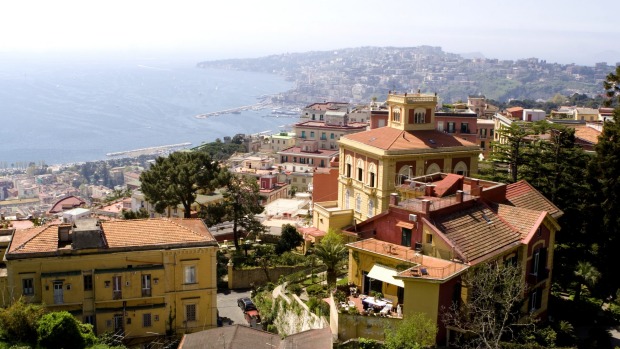
We're like accidental tourists arriving early morning in the port of Naples. Most on the ferry are suited commuters from Sorrento who've left slumbering swarms of tourists behind them. We came from Vico Equense, a few stops down the train line – our base for Pompeii. In Naples we want to see the looted treasures of Pompeii in the Il Museo Archeologico Nazionale di Napoli.
We've heard it all before. Naples is about trash and treasure, pickpockets and pizza. Many tourists avoid a sleepover to see Mount Vesuvius and Pompeii, preferring coastal retreats. Antennae out, we taxi straight to our hotel in the Centro Storico, the gritty heart of Naples. After weeks of airbnb in Italy, we've chosen the luxe Palazzo Decumani, for location and security in this UNESCO heritage-listed area.
Early morning, graffiti, grime and garbage make this near deserted area look like a film set. Dark baroque churches, shuttered shops, narrow cobbled streets with a slash of sky and you're inclined to feel on edge – but it is fear of the imagined.
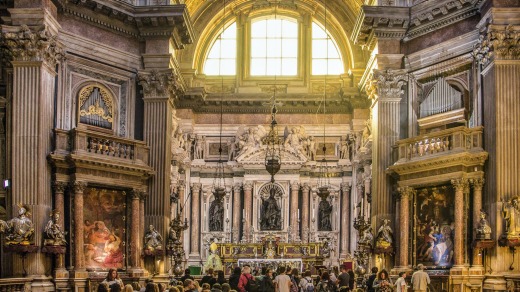
Once the shutters open and roller doors go up on Spaccanapoli, the lower decumani (street), the area comes to life. The name literally means "Naples splitter" and divides the old city in two. The shops are also divided with local hardware, butcher and pasta shops and others selling religious iconography and fruit and vegetable stalls. Souvenir stalls pitching to Italian tourists are setting up with painted soccer stars on tambourines, strings of plastic chillies and toilet rolls printed with the image of disgraced former prime minister Silvio Berlusconi.
Well loved by locals and tourists are the gelato bars, numerous pasticcerie and Bar Nilo for coffee and to pay homage to soccer god Maradona. An outdoor "cake bar" is enticing but it is too early. Less wicked are Sfogliatella the divine shell-shaped pastries we have with fresh orange juice at an outside table. Feeling out of place at this hour, we watch the locals go about their morning routine.
To get to the Archaelogical Museum we walk along Via dei Tribunali, the major decumani of three east-west streets of the ancient Greek and later Roman city of Neopolis. The cardini or laneways run north-south to form the ancient grid of the city. According to UNESCO the city is older than 25 centuries though little remains from that time. Many buildings were demolished in 1860 when the area was a slum. We pass music shops and hear an opera student practising before we get to the conservatorium of music, part of the San Pietro a Majella.
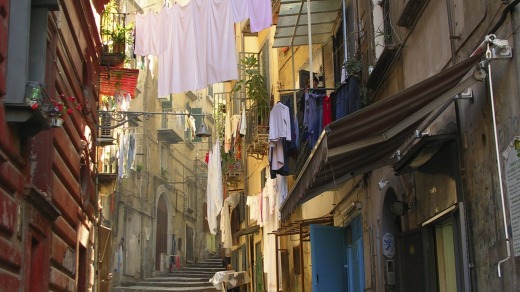
The nearby Archaeolgical Museum exceeds our expectations with a world-class collection of Greek, early Roman, Renaissance and Herculaneum art as well as the relics of Pompeii. The mosaics are exquisite and the Farnese collection has giant statues of impossible detail and scale. Atlas holding up the celestial globe has little kids imitating his lot in life.
The secret room, the Gabinetto Segreto, houses erotic and sexually explicit artworks. The collection has been closed and reopened to a select few over nearly two centuries. It was finally opened to the public in 2000 and since 2005, kept in a separate room. My teen looks at "Pan copulating with a goat" and mutters "Weird". He's not keen to linger.
The nearby MADRE, the Museum of contemporary Art DonnaREgina has no crowds and no cameras allowed. It has a fabulous collection including works by Jeff Koons, Joseph Beuys, Rebecca Horn, Richard Serra and Anish Kapoor who wowed crowds at the MCA in Sydney with his extraordinary large reflective sculptures. These two museums, 2000 years apart, bookend the cultural extremes of the city.
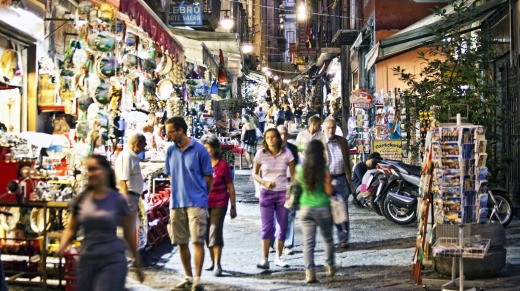
Sandwiched between these extremes is a thriving artisan culture in Centro Storico. In Via San Gregorio Armeno we wander into the workshops of artisans carving and constructing Presepe, the Neapolitan nativity scenes. At Christmas about half a million locals and tourists flock to these streets. An old artisan carves to Lou Reed's Walk on the Wild Side. Overwhelmed by detail I buy a headless character base made of wire and string. He looks at me like I am missing the point.
While the Archeological Museum is the main attraction, Centro Storico has a different pull. The streets are now very crowded – an orchestrated chaos of people traffic, zippy little cars and Vespas that stop for no one, including the crush around popular pizza places. The distraction of so many little shops to peek into and looking up at the architecture and laneways famously flagged with laundry, keeps us on our toes.
The student area around Piazza Belllini with its bars is the place to go for passeggiata, the early evening promenade. But we are heading in the opposite direction to Pizza da Michele. Young boys play pool, older men play cards in sparse neon lit rooms, kids and families are out on the street.
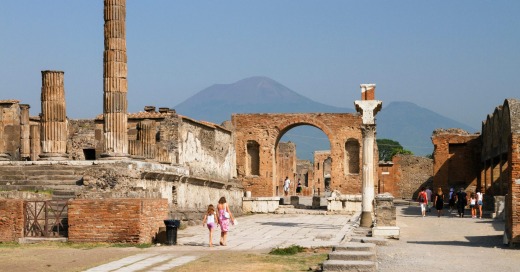
Five generations have been kneading and folding dough since 1870 at Pizza da Michele. There are only two choices, Margherita with fresh mozzarella, tomato and basil and a marinara with only tomato and garlic. We order the former, the colours of the Italian flag. There is no wine only Peroni or mineral water. A scene from Eat Pray Love, was shot here with Julia Roberts eating while advocating guilt-free carb loading to her reluctant dining partner. "This is pizza Margherita in Napoli. It is your moral imperative to eat and enjoy that pizza." Agree! A photo of her famous mouth biting into a pizza is behind glass.
The mood changes as we move hotels to one near the Stazione Centrale to catch our train to Rome early next morning. The traffic around Piazza Garibaldi near the station is chaotic but it seems to work – in a taxi at least. The area is crowded, edgy and slightly seedy. I remind myself that every major city train station has the displaced and dispossessed hanging around. We are all in transit.
After check-in to our quirky but comfortable hotel, we divest ourselves of valuables and buy train tickets. The traffic is challenging and being confident, even if you're faking it, is the only way to step out. Being hyper-alert about personal safety is exhausting. After an early dinner on the same side of the road as our hotel, we bunk down for an early start. As with our arrival, my anxiety plays on my imagination. Chances are you will not be robbed, mugged or murdered and will enjoy your stay. The only given, as Julia Roberts says, is your moral imperative to eat pizza. Embrace the chaos and the culture – be rewarded and not robbed of a fabulous experience.
MORE INFORMATION
comune.napoli.it
italia.it
GETTING THERE
Trains are efficient, safe, comfortable and good value. Buy tickets using your credit card at banks of touchscreen kiosks inside the station; connect from Rome and Pompeii and connect to all stops for the Amalfi Coast from Naples.
STAYING THERE
Palazzo Decumani, its muted contemporary elegance is a balm against the traffic chaos, rooms from $190; see palazzodecumani.com/en/index.
Decumani Hotel de Charme, for old world refurbished charm in Naples' Historical Centre, rooms from $255; see decumani.com. The Grand Hotel Europa is a large, quirky, three-star hotel opposite the station, rooms from $140; see grandhoteleuropa.com/en/.
The writer travelled at her own expense.
NAPOLI SOTTERRANEA
Go 40 metres underground to visit the founding site of Neopolis, there was an aquaduct and its tanks and tunnels were used as bomb shelters in World War II; see napolisotterranea.org.
MOUNT VESUVIUS
Allow a half-day trip. The Vesuvius National Park has detailed info and you can walk it yourself or do a tour; see viator.com.
PALAZZO REALE (Royal Palace)
The Royal Palace was the main residence of the Bourbon kings in the early 18th century; see napoliunplugged.com.
PIAZZA DEL PLEBISCITO
Teatro San Carlo – located in the palace grounds. Established in 1737, this the oldest opera house in Europe; see teatrosancarlo.it/,
CASTEL NUOVO
For views of the harbour visit this strategic medieval fortress and civic art museum; see comune.napoli.it.